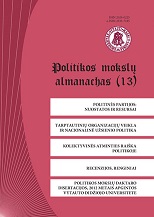Kaita ir nacionalinė tapatybė užsienio politikos studijose: Lietuvos atvejis
National identity and change in foreign policy studies: the case of lithuania
Author(s): Ieva KarpavičiūtėSubject(s): Politics / Political Sciences
Published by: Vytauto Didžiojo Universitetas
Keywords: Užsienio politika; konstruktyvizmas; Lietuvos užsienio politika; nacionalinė tapatybė; foreign policy; constructivism; Lithuanian foreign policy; national identity
Summary/Abstract: Straipsnyje gilinamasi į konstruktyvizmo teorinės prieigos analitines galimybes užsienio politikos tyrimuose. Išskiriami analizės elementai: vertybės, normos, nacionalinė tapatybė, jos poveikis valstybės užsienio ir saugumo politikos prioritetams, jų kaitai. Taikant teorinę konstruktyvizmo prieigą, straipsnyje nagrinėjamos Lietuvos nacionalinės tapatybės sąsajos su šalies užsienio politika, siekiama išskirti pagrindines vertybes ir normas, kurios buvo reikšmingiausios esminiuose užsienio politikos formavimo ir kaitos etapuose, ir taip atskleisti šalies nacionalinės tapatybės pokyčius. Lietuvos užsienio politikos raida skirstoma į keturis etapus, kurie ir žymi nacionalinės tapatybės ir šalies užsienio politikos kaitą: 1990–1994 m. – suverenumo įtvirtinimo, 1994–2004 m. – integracijos, 2004–2010 m. – euforijos, nuo 2010 m. – pragmatizmo ir specializacijos. Greta gilinamasi į santykio tarp „aš“ ir „kitas“ konstravimo procesą Lietuvos užsienio politikoje, apžvelgiant reikšmingiausius šalies užsienio politikos elementus. Constructivism is one of the best developed and one of the most popular theoretical approaches in Foreign Policy analysis. The analytical tools of constructivism with its normative elements as values, norms, national identity are of fundamental importance for the deep and thorough foreign policy analysis. Constructivism helps to merge national and international analysis levels; it provides possibility to analyze and value foreign policy dynamics and to indicate the interdependence among foreign policy and national identity. While applying social constructivism, this article looks into the change of Lithuanian foreign policy and its ties with national identity, through the development and institutionalization of certain values and norms, as well as their inclusion into/and exclusion from foreign policy agenda. Evolution of Lithuanian foreign policy is seen through the lens of four periods: sovereignty period (1990-1994), period of integration into Euro-atlantic institutions (1994-2004), period of euphoria, when crucial foreign policy goals are reached and country starts to position itself in Euro-atlantic institutions (2004-2010), and the period of pragmatism and specialization (since 2010), when mainstreams, interests and goals within regional organizations are defined, and country can bring more attention to the process of specialized interest setting (energy security, nuclear safety and security, cyber security, ect.) within EU and NATO, including by closer cooperation with sub-regional countries Nordic, Baltic, as well as keeping in foreign policy agenda the promotion of Eastern European integration into EU and NATO. In the context of foreign policy dynamics, the perception of “we” and “the other” is one of the most interesting for constructivist scholars. The article identifies the dynamics of “we” category and basic trend in defining “the other” in Lithuanian foreign policy.
Journal: Politikos mokslų almanachas
- Issue Year: 2013
- Issue No: 13
- Page Range: 99-134
- Page Count: 36
- Language: Lithuanian

